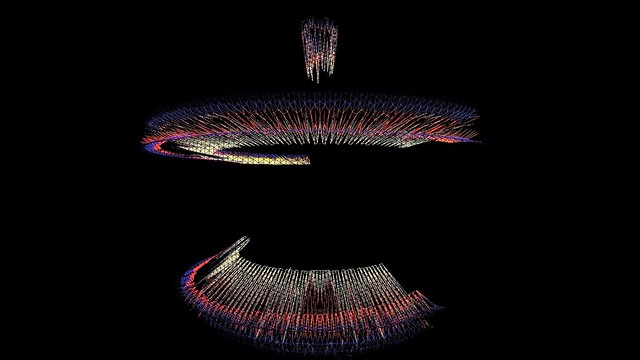Swaayattate (Autonomy) (2020) is an investigation into the complex entanglements of the synthetic and organic worlds. Envisioned as a trilogy of films, the works are set in the geographic context of a local computer repair marketplace in Bangalore, India and examines the nature of human-machine relationships through the contemporary lens of gender, caste and labour.
The films traverse across multiple timelines as the evolution of an embedded neural network references prescient concerns around language, accessibility and justice. Portions of the scripts for the films are written in collaboration with a text based neural network (GPT-2 Transformer) and sometimes recited by a synthetic generative voice. Coherence between chapters is achieved by way of employing the format of storytelling rooted in indigenous oral history practices along with the simultaneous examination of language models from a neural network’s perspective.
Chapter 1 – #algofeels 04m09s
In #algofeels (2020), Vishal Kumaraswamy ascribes identity traits to an embedded neural network trapped within an assemblage of networked components. The network’s thoughts are derived from open-source machine learning tools, such as poetry bots and speech generators. #algofeels is a portion of a larger body of work that explores imagined dialogues between humans and machines rooted in the geographical context of a computer repair marketplace that Vishal Kumaraswamy frequents. In this excerpt, we hear a conversation unfolding between a programmed AI, dismembered from its physical body as it undergoes repairs, and the computer technician working on it. References are made to an existing bond as the AI cycles through past interactions and draws from its bank of speech generators to put forth cogent arguments for the decline in the health of this human-machine relationship.
The ambiguity lies in whether the dialogue occurs in real time or if it is simply a figment of the technician’s imagination and is followed by an ‘inner monologue’ of the AI’s own neural engine. The cadence and choice of words used by the technician are seemingly his own, yet
portions of it were generated via a text-based neural network (talktotransformer.com). These, alongside the visuals, are meant to serve as a simulation of traversing the streets of the marketplace as gathered and interpreted by the very machine that is being repaired.
Chapter 2 – ADI 06m40s
Chapter 2 adds an element of interaction by way of a playable interaction of performing simulated computer repairs. Viewers are only allowed to access the film upon completion. In ADI, the neural network begins to show signs of sentience as understood by humans. The conversation is far more complex than in the previous chapter and it is able to display the traits and behaviours learned by observing the humans it has come into contact with.
Narrated entirely in Kannada, the language of the repair technician, the non-human protagonist is able to explicitly state its opposition to being gendered and demonstrates the formation of an amalgamated identity. Over the course of the film, the viewers are also privy to the encoding of the socio-cultural reality of the technician onto the network and hierarchies are blurred as the neural network attains autonomy. The work makes explicit
references to gender, language and indigeneity. The futurism in the film is built upon the lack of consideration to address diverse groups of users by technology and tech corporations today.
Chapter 3 – Sapience 05m03s
Sapience shifts timelines considerably and occurs as a nostalgic message relayed by the neural network to a terminally ill technician. Referencing a seminal moment in future history, the viewers discover an incredibly advanced algorithmic being. Questions are raised about the duty of care between humans and machines and the irrelevance of hierarchies now.
Decades of machine misuse and neglect by humans has created newer forms of communication between machines and doubts are cast upon past desires to inhabit an anthropomorphic body.
Swaayattate (Autonomy)
15m52s, Trilogy of Films, 2020,
Credits:
Composers: Nikhil Narendra Akrti, Kartik Pillai, Lobo Loco
Mixing: Nikhil Narendra
Kannada Translation: Dadapeer Jyman
Voiceover: Shilok Mukkati, Vishal Kumaraswamy
3D Modelling: Advait Chavan
Game Design: The Dwarven Brothers
Thanks to: Mamta Sagar, Roshnee Kumar, Samantha Harvey
Full videos hosted at www.empathyloading.com. Excerpt below.
